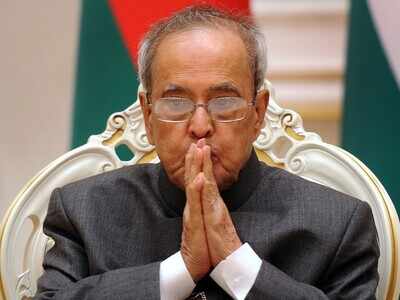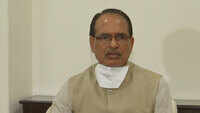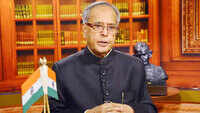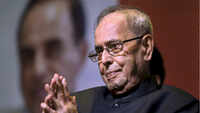
NEW DELHI: An evening at his 10, Rajaji Marg residence, soon after he demitted office as the 13th President of India in 2017, Pranab Mukherjee was in a chatty mood, typical of an 'adda-loving' Bengali, busy mostly with writing his book (Coalition years) and his endless reading, in the autumn of his almost 50-year-long hectic political career, that began in 1969.
In a freewheeling conversation session, he enlightened us, (three journalists) on little known facts about the first general elections in 1952. A candidate in West Bengal had chewed up a ballot paper that went in his rival’s favour, after the counting showed that the two highest scorers had finished with equal number of votes. So, he won after a recount (the system had not evolved a remedy for an unprecedented situation as this). After a hearty laugh over the story, Mukherjee came up with another gem from the 1952 election vintage. Many contestants... different symbols. A village voter, who supported one with a banyan tree as his symbol, went up to the big banyan tree in his village after casting his vote and left the ballot paper in the trunk of the tree, to elect his candidate. This is what he had gathered from the government’s efforts to educate voters for the first-time exercise.
No google search could throw up such historical treasures — never-ending stream of anecdotes — that flowed out from this short, lean, man, known for his deep knowledge and elephantine memory, that often made him “indispensable” for his party, his government, to journalists and even scholars of our political system, for half a century.
Pranab Mukherjee knew his Sanskrit shlokas as well as the Indian Constitution. They were etched in his memory like some of his favourite Bengali poems from Tagore to the contemporary. A thorough Congressman, he was best of friends with some of his contemporary Communist leaders like Jyoti Basu to Sitaram Yechury. He enjoyed a cordial relationship with socialists and BJP leaders.
If he started his day with two hours of uninterrupted prayers — reciting the Chandi and performing daily rituals at the alter — he always carried a copy of the Constitution in his black attache and swore by it. “We are actually using this book each and every moment of our lives,” he had told a journalist long years ago.
Once in Lok Sabha during the A B Vajpayee regime, Mukherjee as opposition leader, had to defend his benches in a debate that touched upon the drunken behaviour of some of the Hindu gods and goddesses, against the ruling BJP. Pranab's contention that the scriptures indeed contained such references outraged the saffron brigade who rose to protest in unison against the Opposition leader's irreverent attitude towards providence. Mukherjee rattled off relevant shlokas with appropriate English translations. That ended the debate.
Like a typical temperamental teacher, “Pranab da” as he was referred to by those familiar with him, never held himself back from yelling at anyone who seemed ill-informed, unprepared or ignorant — journalist or colleague, senior or junior — with a query for which answers could only come from him. “Why don’t you do your homework, am I here to educate you, first know your facts, do some homework...” was a common refrain from a visibly angry man, to journalists looking for a story.
But, it would not take him long to cool down, even provide valuable information, as regulars at his durbar had figured out after some practice — he had to be wired away to another subject, preferably one that interests him or ask for his perspective rather than fire at point-blank for specific information.
Shouted at or not, they always returned to the man of all seasons — in government or in opposition — for he was a good teacher and the students knew it. When in government, late night appointments at his home office at 13, Talkatora Road, was typical for journalists, politicos and other callers.
Before he retired for the day, Mukherjee unfailingly wrote a page or two in his closely guarded diary narrating the day's important meetings and incidents. A keen student of history, he knew the importance of these diaries as primary source material for any scholar keen to delve into the country's political history of his times.
On the last day of office in Parliament before he was filing for the Presidential elections, he found time for an interview with the TOI. The slotted 10 minutes went off into half an hour of wonderful conversation, only because the reporter was prompt in recalling the name of a book in Bengali by historian Tapan Ray Choudhury, when he was fumbling for it. That changed the atmospherics for a charming interaction.
Not surprisingly, the master of political play had great admiration for Chanakya or Kautilya. He had not only read the Arthasashtra but most books till date on the man and his works. One of the things he carried to the Rashtrapati Bhawan from his Talkatora Road home office and to Rajaji Marg was a portrait of the medieval Indian Machiavelli, that hung on the wall.
A young journalist asked him “what happened at the cabinet meeting” when he was a member of PV Narasimha Rao’s team. The reply was curt and swift, “what happened at the cabinet… you expect me to tell you...don’t you know I am under oath…” The journalist learnt his lesson. The next time he kept his questions to just two listed cabinet agenda and simply asked about the minister’s views on the issue, without mentioning the cabinet meeting… it worked. Without dishonouring the oath of office, Mukherjee explained the issues, providing all the clues needed to run the story.
A voracious reader since childhood, the man who built his career first as a professor of economics at Vidyasagar College, Kolkata (1963) and then in politics, with knowledge as his capital, Mukherjee could never sit idle without reading. The range was from official files to books on history, politics, economics or diplomacy, a biography or a memoir, a newspaper or a magazine, to a bestseller in English or Bengali. This habit, backed by a graphic memory and a rare capacity to slog for long hours was his core strength.
For one who was not a mass leader, having lost many elections before he won the Lok Sabha in 2004, Pranab Mukherjee — “The Man who knew much, if not Too Much” about the labyrinth that is India’s politics and governance for almost half a Century, made his way through its choppy waters, with distinction essentially for his understanding of the crisis and the immense ability to deal with it.
In a freewheeling conversation session, he enlightened us, (three journalists) on little known facts about the first general elections in 1952. A candidate in West Bengal had chewed up a ballot paper that went in his rival’s favour, after the counting showed that the two highest scorers had finished with equal number of votes. So, he won after a recount (the system had not evolved a remedy for an unprecedented situation as this). After a hearty laugh over the story, Mukherjee came up with another gem from the 1952 election vintage. Many contestants... different symbols. A village voter, who supported one with a banyan tree as his symbol, went up to the big banyan tree in his village after casting his vote and left the ballot paper in the trunk of the tree, to elect his candidate. This is what he had gathered from the government’s efforts to educate voters for the first-time exercise.
No google search could throw up such historical treasures — never-ending stream of anecdotes — that flowed out from this short, lean, man, known for his deep knowledge and elephantine memory, that often made him “indispensable” for his party, his government, to journalists and even scholars of our political system, for half a century.
Pranab Mukherjee knew his Sanskrit shlokas as well as the Indian Constitution. They were etched in his memory like some of his favourite Bengali poems from Tagore to the contemporary. A thorough Congressman, he was best of friends with some of his contemporary Communist leaders like Jyoti Basu to Sitaram Yechury. He enjoyed a cordial relationship with socialists and BJP leaders.
If he started his day with two hours of uninterrupted prayers — reciting the Chandi and performing daily rituals at the alter — he always carried a copy of the Constitution in his black attache and swore by it. “We are actually using this book each and every moment of our lives,” he had told a journalist long years ago.
Once in Lok Sabha during the A B Vajpayee regime, Mukherjee as opposition leader, had to defend his benches in a debate that touched upon the drunken behaviour of some of the Hindu gods and goddesses, against the ruling BJP. Pranab's contention that the scriptures indeed contained such references outraged the saffron brigade who rose to protest in unison against the Opposition leader's irreverent attitude towards providence. Mukherjee rattled off relevant shlokas with appropriate English translations. That ended the debate.
Like a typical temperamental teacher, “Pranab da” as he was referred to by those familiar with him, never held himself back from yelling at anyone who seemed ill-informed, unprepared or ignorant — journalist or colleague, senior or junior — with a query for which answers could only come from him. “Why don’t you do your homework, am I here to educate you, first know your facts, do some homework...” was a common refrain from a visibly angry man, to journalists looking for a story.
But, it would not take him long to cool down, even provide valuable information, as regulars at his durbar had figured out after some practice — he had to be wired away to another subject, preferably one that interests him or ask for his perspective rather than fire at point-blank for specific information.
Shouted at or not, they always returned to the man of all seasons — in government or in opposition — for he was a good teacher and the students knew it. When in government, late night appointments at his home office at 13, Talkatora Road, was typical for journalists, politicos and other callers.
Before he retired for the day, Mukherjee unfailingly wrote a page or two in his closely guarded diary narrating the day's important meetings and incidents. A keen student of history, he knew the importance of these diaries as primary source material for any scholar keen to delve into the country's political history of his times.
On the last day of office in Parliament before he was filing for the Presidential elections, he found time for an interview with the TOI. The slotted 10 minutes went off into half an hour of wonderful conversation, only because the reporter was prompt in recalling the name of a book in Bengali by historian Tapan Ray Choudhury, when he was fumbling for it. That changed the atmospherics for a charming interaction.
Not surprisingly, the master of political play had great admiration for Chanakya or Kautilya. He had not only read the Arthasashtra but most books till date on the man and his works. One of the things he carried to the Rashtrapati Bhawan from his Talkatora Road home office and to Rajaji Marg was a portrait of the medieval Indian Machiavelli, that hung on the wall.
A young journalist asked him “what happened at the cabinet meeting” when he was a member of PV Narasimha Rao’s team. The reply was curt and swift, “what happened at the cabinet… you expect me to tell you...don’t you know I am under oath…” The journalist learnt his lesson. The next time he kept his questions to just two listed cabinet agenda and simply asked about the minister’s views on the issue, without mentioning the cabinet meeting… it worked. Without dishonouring the oath of office, Mukherjee explained the issues, providing all the clues needed to run the story.
A voracious reader since childhood, the man who built his career first as a professor of economics at Vidyasagar College, Kolkata (1963) and then in politics, with knowledge as his capital, Mukherjee could never sit idle without reading. The range was from official files to books on history, politics, economics or diplomacy, a biography or a memoir, a newspaper or a magazine, to a bestseller in English or Bengali. This habit, backed by a graphic memory and a rare capacity to slog for long hours was his core strength.
For one who was not a mass leader, having lost many elections before he won the Lok Sabha in 2004, Pranab Mukherjee — “The Man who knew much, if not Too Much” about the labyrinth that is India’s politics and governance for almost half a Century, made his way through its choppy waters, with distinction essentially for his understanding of the crisis and the immense ability to deal with it.
Download
The Times of India News App for Latest India News

Coronavirus outbreak
Trending Topics
LATEST VIDEOS
India
 India mourns former President Pranab Mukherjee
India mourns former President Pranab Mukherjee  GDP growth contracts by 23.9% in Q1 due to Covid pandemic
GDP growth contracts by 23.9% in Q1 due to Covid pandemic  Jammu and Kashmir: 6 civilians injured in grenade attack in Baramulla
Jammu and Kashmir: 6 civilians injured in grenade attack in Baramulla  MP floods: Focus on providing drinking water, food to sufferers, says CM Chouhan
MP floods: Focus on providing drinking water, food to sufferers, says CM Chouhan  Pranab Mukherjee: 10 things to know about the former President
Pranab Mukherjee: 10 things to know about the former President  Former President Pranab Mukherjee passes away at 84
Former President Pranab Mukherjee passes away at 84
More from TOI
Navbharat Times
Featured Today in Travel
Quick Links
Coronavirus in MumbaiCoronavirus in KolkataCoronavirus in HyderabadCoronavirus in DelhiCoronavirus in BangaloreCoronavirus symptomsCoronavirus in IndiaWhat is CoronavirusCoronavirus NewsSolar EclipseNPRWhat is NRCCAB BillCAB and NRCRTI BillPodcast newsLok SabhaShiv SenaYSRCPCongressBJP newsUIDAIIndian ArmyISRO newsSupreme Court
Get the app



